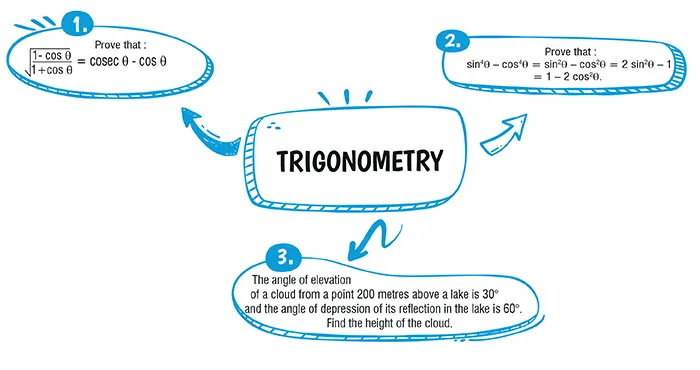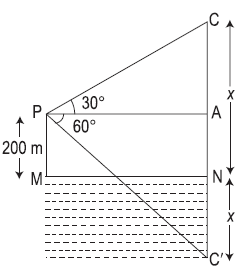Table of Contents

Ans. (b)
Explanation:
\frac{cos A}{1- sin A} - tan A \\
= \frac{cos A(1+sin A)}{1-sin A(1+ sin A)}- tan A \\
=\frac{cos A(1+ sin A)}{(1+sin^2 A)} -tan A \\
= \frac{cos A(1+ sin A)}{cos^2 A} - tan A \\
= \frac{(1+sin A)}{cos A} -tan A \\
= \frac{1}{cos A} + \frac{sin A}{cos A} - tan A
Ans. (b)
Explanation:
\frac{cos A}{1-sin A} -tan A = \frac{cos A(1+ sin A)}{(1- sin A)(1+ sin A)} - tan A \\
= \frac{cos A(1+sin A)}{1+sin^2 A} - tan A \\
= \frac{cos A(1+ sin A)}{cos ^2 A} - tan A \\
= \frac{1+ sin A}{cos A} - tan A \\
= \frac{1}{cos A} + \frac{sin A}{cos A} - tan A \\
= sec A + tan A - tan A = sec A.
Explanation:
(i) L.H.S.
=\sqrt{\frac{1-cos\theta}{1+cos\theta}×\frac{1-cos\theta}{1-cos\theta}} \\
=\sqrt{\frac{(1-cos\theta)^2}{1+cos^2\theta}} \\
=\frac{1-cos\theta}{\sqrt{1-cos^2\theta}} \\
=\frac{1-cos\theta}{\sqrt{sin^2\theta}} \\
=\frac{1-cos \theta}{sin \theta}\\
=\frac{1}{sin \theta}-\frac{cos \theta}{sin \theta} \\
= cosec θ – cot θ \\
\text{= R.H.S. Hence Proved.} \\
\text{(ii)L.H.S.=} \sqrt{\frac{1+sin \theta}{1-sin\theta}×\frac{1+sin \theta}{1+sin\theta}} \\
=\sqrt{\frac{(1+sin\theta)^2}{1-sin^2\theta}} \\
= \frac{1+sin\theta}{cos\theta} = \frac{1}{cos\theta} + \frac{sin\theta}{cos \theta} \\
= sec θ + tan θ = R.H.S. Hence Proved
Explanation:
Consider,
sin^4θ – cos^4θ = (sin^2 θ)^2 – (cos^2 θ)^2 \\
= (sin^2 θ – cos^2θ)(sin^2θ + cos^2θ) [∵ (a – b)(a + b) = a^2– b^2] \\
= (sin^2 θ – cos^2θ) × 1 [∵ sin^2θ+ cos^2θ= 1] \\
= sin^2θ – cos^2θ \\
= sin^2θ – (1 – sin^2θ) [∵cos^2θ = 1 – sin^2θ] \\
= sin^2θ – 1 + sin^2θ \\
= 2 sin^2θ – 1 \\
= 2(1 – cos^2θ) – 1 [∵ sin^2θ =1 – cos^2θ] \\
= 2 – 2 cos^2θ – 1 \\
= 1 – 2 cos^2θ. Hence Proved.
Explanation:
Let P be the point of observation and C, the position of cloud. CN perpendicular from C on the surface of the lake and C‘ be the reflection of the cloud in the lake so that

CN = NC´ = x (say)
Then, PM = 200 m
∴ AN = MP = 200 m
CA = CN – AN
= (x – 200) m
C´A = NC´ + AN
= (x + 200) m
Let PA = y m
Then, in right angled Δ PAC,
\frac{CA}{PA} =tan 30 \\
⟹ \frac{x+200}{y} =
\sqrt{3} \\
⇒x + 200 = \sqrt{3}y \\
⟹ y = \frac{y+200}{\sqrt{3}} ...(ii) \\
\text{From equations (i) and (ii),}\\
\frac{x+200}{y} = \sqrt{3} (x-200)\\
⇒ x+200 = 3(x–200)
⇒ x+200 = 3x–600
⇒ 2x = 800
⇒ x = 400 m
Hence, the height of the cloud = 400 m.
Download Mind Map of this chapter
Download NowWant to Practice Mock Tests of this chapter
Practice NowDownload Important Questions of this chapter
Download Now| Chapter No. | Chapter Name |
|---|---|
| Chapter 1 | Goods and Service Tax (GST) |
| Chapter 2 | Banking |
| Chapter 3 | Shares and Dividends |
| Chapter 4 | Linear inequations |
| Chapter 5 | Quadratic Equations in one variable |
| Chapter 6 | Ratio and proportion |
| Chapter 7 | Factorization |
| Chapter 8 | Matrices |
| Chapter 9 | Arithmetic Progression |
| Chapter 10 | Geometric Progression |
| Chapter 11 | Coordinate Geometry |
| Chapter 12 | Reflection |
| Chapter 13 | Similarity |
| Chapter 14 | Loci |
| Chapter 15 | Circles |
| Chapter 16 | Constructions |
| Chapter 17 | Mensuration |
| Chapter 18 | Trigonometry |
| Chapter 19 | Statistics |
| Chapter 20 | Probability |
| Chapter Wise Important Questions for ICSE Board Class 10 Mathematics |
|---|
| Goods and Service Tax (GST) |
| Banking |
| Shares and Dividends |
| Linear inequations |
| Quadratic Equations in one variable |
| Ratio and proportion |
| Factorization |
| Matrices |
| Arithmetic Progression |
| Geometric Progression |
| Coordinate Geometry |
| Reflection |
| Similarity |
| Loci |
| Circles |
| Constructions |
| Mensuration |
| Trigonometry |
| Statistics |
| Probability |
CBSE Important Questions Class 10
ICSE Important Questions Class 10
CBSE Important Questions Class 10
ICSE Important Questions Class 10